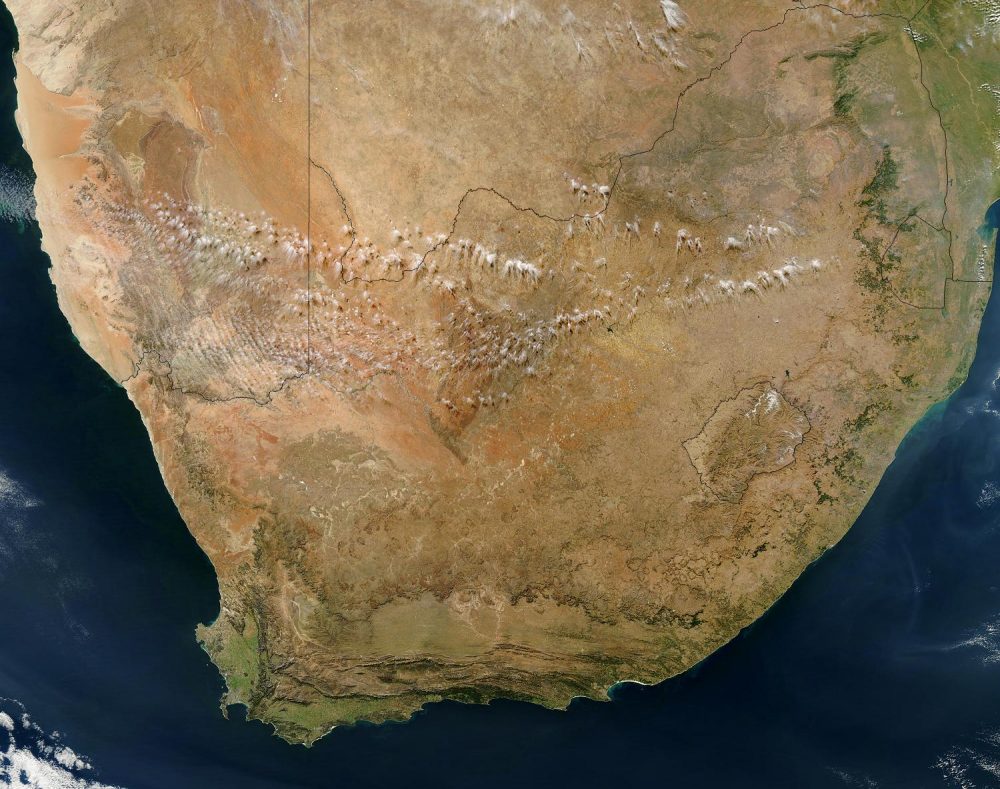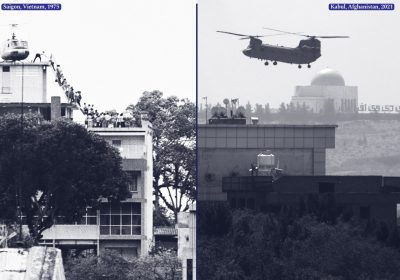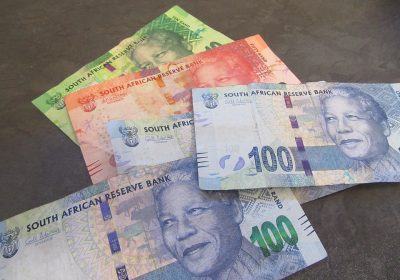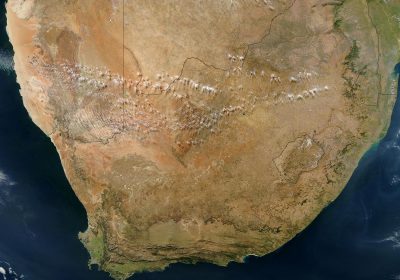
![]()
Intelligence Research Observatory
Deversor Intelligentia Analyticum
Welcome to Deversor Intelligentia Analyticum, a space where De Faakto publishes intelligence notes and observations from analytic professionals in the intelligence community. Deversor Intelligentia Analyticum provides an opportunity for intelligence writers to speak truth to power on important topics. The observations and intelligence notes of Deversor Intelligentia Analyticum are raw, unedited perspectives from the independent analyst. Deversor Intelligentia Analyticum articles are solely the research and analysis of the individual author and do not necessarily reflect the opinion of De Faakto Intelligence Research Observatory. Deversor Intelligentia Analyticum supports analysis from those who choose to write under a pseudonym for operational security reasons. Please enjoy Deversor Intelligentia Analyticum.
Author & Background
Gerrie Coetzee-Swart
Gerrie Coetzee-Swart holds a Masters (International Relations) (Cum Laude) degree from the University of Pretoria, South Africa. He is a former lecturer at the Department of Political Sciences, University of South Africa (UNISA) (2007-2008) and former lecturer at the Department of Political Science, Stellenbosch University (2009-2019). He is currently CEO & Director of Acuity Africa Consultancy – a political research and consultancy firm based in Johannesburg, South Africa.
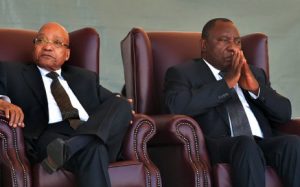
[Photo Courtesy of EWN Eye Witness News- Former President Jacob Zuma & President Cyril Ramaphosa]
South Africa: A Failed State, Governed by a Failing Government
Synopsis
This article provides a brief overview of South Africa’s increasingly fragile democracy under the leadership of the ruling African National Congress (ANC). It provides a brief overview of the country’s dwindling democratic fortunes since 1994. The article proceeds to examine the country’s massive challenge against widespread corruption by the ruling ANC, most notably the phenomenon of State Capture whereby the country’s former President, Jacob Zuma was implicated alongside several other party members, government ministers and state officials in the mass looting of state resources and grand corruption. It further probes the attempts by current President Cyril Ramaphosa to address corruption, which subsequently has fueled massive tensions within the ruling ANC party, threatening to undermine political stability even further. The article further probes the country’s dire economic situation due to the scourge of corruption as well as the impact of the COVID-19 pandemic on the country’s economy. A salient aspect addressed by the article is the extent to which South Africa is increasingly teetering on the precipice of becoming a failed state, which holds severe consequences for the country’s national security and stability amidst growing discontent by its citizenry.
Nearly 25 years since it gained independence in a much-vaunted and celebrated democratic election in 1994, the South African state is teetering on the precipice and is on the brink of becoming a failed state. This is compounded by the fact that it is being ruled by a failing government implicated in arguably one of the worst instances of State Capture and corruption ever witnessed.
The prognosis for South Africa is dire. Virtually every critical element of the State is rapidly eroding and in a perpetual state of decay. The country faces the specter of impending state failure, collapse and complete implosion if the rapidly unfolding crisis is not arrested in its tracks. The country’s troubled political and socio-economic landscape poses a clear and present danger for its national security and stability. In many respects the country is ripening for a political revolution, which could trigger mass protests and a potential popular uprising by citizens akin to the Arab Spring uprisings that were witnessed in North Africa during 2011.
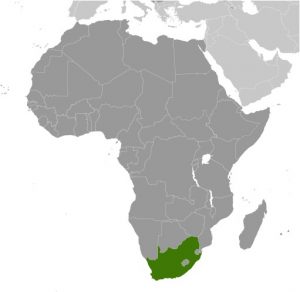
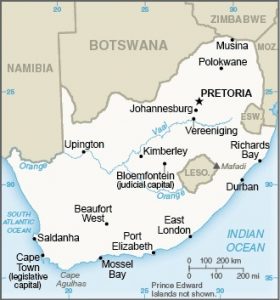
[Map Images Courtesy of CIA World Factbook]
Democracy in Decay
As observed by Alence and Pitcher (2019) on 8 May 2019, nearly twenty-five years to the day after Nelson Mandela was inaugurated as South Africa’s first democratically elected president, the country went to the polls in its sixth round of national elections. Mandela’s African National Congress (ANC) had won by comfortable margins in every previous election, all peaceful, “free and fair” contests administered by the country’s well-regarded electoral commission. Much of the skepticism about the quality of South Africa’s democracy has centered on the ease with which the ANC wins elections. With the majority of voters committed to the ANC, the essence of democracy as described by Joseph Schumpeter—elite competition for voter support—seems to be lacking. And South Africans seem to be in no rush to pass Samuel Huntington’s two-turnover test of democratic consolidation (Alence and Pitcher 2019).
At first glance, the run-up to the 2019 election looked like more of the same. The ANC’s presidential candidate, Cyril Ramaphosa campaigned on the lofty promise of bringing a “new dawn” that would reinfuse the country with Mandela’s values. He had the pedigree to make this promise credible (Alence and Pitcher 2019). He played a central role in the political negotiations that brought South Africa out of apartheid, and he was a key architect of the country’s progressive, democratic 1996 Constitution. He was widely touted as Nelson Mandela’s anointed successor, but then Deputy President Thabo Mbeki ascended power and ruled South Africa from 1999-2008. Ramaphosa departed active politics and had a meteoric rise as businessman. He later returned to active politics, becoming South Africa’s deputy president after the 2014 national election.
As Alence and Pitcher further observed ‘Ramaphosa’s “new dawn” represented more than just the politician’s clichéd promise of a brighter future: For South Africans alarmed by the country’s recent political turmoil, it also subtly alluded to a period of darkness that he vowed to relegate to the past. That darkness was the presidency of Jacob Zuma (2009–2018), which Ramaphosa referred to in several speeches as “nine wasted years.” Under Zuma, a sprawling network of corrupt procurement involving high-level politicians, public officials, and business cronies took root both in the government and across South Africa’s state-owned enterprises (SOEs). The crisis was so dire that a previously little-known academic term—”state capture”—became part of the public lexicon (Alence and Pitcher 2019). The term described activities that ran much deeper than the garden-variety diversion of public resources for private gain; under Zuma, powerful individuals systematically sought to undermine the institutions designed to keep such abuses in check. The assault on these institutions of political and legal accountability posed an existential threat to South Africa’s democracy. It also inflicted substantial collateral damage on the country’s fragile economy and society.
State capture seriously eroded the seemingly strong democratic foundations that had been laid by the Mandela administration in 1994. South Africa’s democratic project was already at risk under the stewardship of the Mbeki administration. Jacob Zuma served as Deputy President in the Mbeki government and was already notorious for his undue benefits secured from the country’s highly controversial arms deal. Due to massive scandal over the arms deal Zuma was forced to resign. This caused a massive backlash within the ruling ANC, and President Thabo Mbeki was subsequently recalled, and forced to resign as President of the Republic of South Africa in 2008 after a protracted struggle within the ruling party. Zuma subsequently ascended the Presidency of the ANC and finally the Presidency of the Republic of South Africa, which was seen as a massive blow to South Africa’s embattled democracy. The Zuma Presidency was riddled with endemic corruption, cronyism and ultimately became the chief architect and prime suspect of the massive state capture project, which ultimately forced Jacob Zuma to resign as President of South Africa in 2018.
During the 2019 National Government elections the ANC won 58 percent of the vote and 230 seats in the 400-seat National Assembly, the main house of South Africa’s Parliament.1 These numbers both ensured that the ANC would remain the majority party and handed Ramaphosa the office of president, formally filled by parliamentary vote (Alence and Pitcher 2019).
The ANC’s closest rival, the centrist Democratic Alliance (DA), managed only 21 percent of the vote and took 84 seats in the Assembly. Twelve smaller parties also won parliamentary seats. As Alence and Pitcher observe ‘by the ANC’s historical standards, however, the results were less impressive: They marked the party’s smallest-ever national majority and the first time its vote share fell below 60 percent. The ANC lost the most ground to the Economic Freedom Fighters (EFF), the party founded in 2013 by Julius Malema—a former president of the ANC’s youth league. Feeding on populist resentment of the political and economic elite among many black South Africans, the EFF earned 11 percent of the vote and 44 seats, establishing it as the largest-ever challenger on the ANC’s left flank. The Economic Freedom Fighters have significantly contributed towards the increasing radicalization of South African politics, most significantly leading the call for radical economic transformation of the country’s economy, which it believes still remains largely controlled by white monopoly capital.
South Africa’s presented political landscape has become an extremely volatile and toxic environment. The country’s extremely unstable political situation has adversely affected its economic stability.
Radical Economic Destabilization: South Africa’s Endemic Corruption Pandemic
South Africa’s performance on a range of social, economic and governance measures deteriorated more in the past 12 years than any other nation not at war, according to Eunomix Business & Economics Ltd, a Johannesburg-based political-risk advisory company. The decline is likely to continue as the country wrestles with the consequences of nine years of worsening corruption and policy paralysis under former President Jacob Zuma (Bloomberg 2019). The fragility of the economy may also limit the tenure of his successor Cyril Ramaphosa. An index of security, governance, prosperity and welfare indicators shows South Africa slumped to 88th out of 178 nations in 2018 from 31st in 2006, according to an analysis of the country’s prospects by Eunomix (Bloomberg 2019). South Africa’s decline in ranking is only been superseded by conflict-riven countries such as Mali, Ukraine and Venezuela.
The likelihood of arresting the decline is limited by the unsustainable structure of South Africa’s economy, in which economic power is largely held by an elite that wields little political influence, a product of its apartheid history and its status as one of the world’s most unequal societies, Eunomix further observed (Bloomberg 2019). The Eunomix prognosis was largely dire: The developmental state project has failed. South Africa is now a fragile state, expected to continue to weaken.
President Ramaphosa, acutely aware of the impending danger to his Presidency issued an unprecedented letter to his party, the ANC, in August 2020 as the COVID-19 pandemic continued to rage. Most significantly the President’s letter in particular addressed the scourge of corruption that infected the ruling ANC
‘Dear Comrade,
LET THIS BE A TURNING POINT IN OUR FIGHT AGAINST CORRUPTION
‘I write this letter to you, my fellow ANC member, as our movement and our country face one of the greatest challenges since the advent of democracy. I am sure that you are aware that across the nation there is a sense of anger and disillusionment at reports of corruption in our response to the coronavirus pandemic. This anger is understandable and justified. In recent weeks, we have heard stories of tenders for personal protective equipment that have been given to individuals associated with ANC leaders and of public servants flouting the law in issuing tenders. What has caused the greatest outrage is that there are private sector companies and individuals (including civil servants) who have exploited a grave medical, social and economic crisis to wrongfully enrich themselves. This is an unforgivable betrayal for the millions of South Africans who are being negatively affected by the impact of COVID-19, experiencing hunger daily, hopelessness and joblessness.’ (Ramaphosa 2020).
The President’s letter further explored the ANC’s commitment to root out corruption:
‘At the 54th ANC National Conference in December 2017, our organization’s highest decision-making body, in reflecting on corruption, noted that there is an increase in corruption, factionalism, dishonesty and other negative practices that seriously threaten the goals and support of the ANC. The Conference further said that these practices contradict and damage our mission to serve the people and use the country’s resources to achieve development and transformation. Corruption robs our people of billions that could be used for their benefit. Conference further said that the lack of integrity perceived by the public has seriously damaged the ANC’s image, the people’s trust in the ANC, our ability to occupy the moral high ground and our position as leader of society. It was with this in mind that conference accordingly declared: “The ANC commits to the people of South Africa that we shall isolate and root out corrupt tendencies in the public and private sectors.”
The President further stressed that ‘emboldened by the decisions of our conference, we embarked on a number of measures to tackle corruption in the public sector. Since the 54th National Conference, we have taken decisive measures in government to disrupt and dismantle the state capture networks and decisively deal with the scourge of corruption.’ (Ramaphosa 2020).
The President further observed that:
‘As mandated by Conference, we have worked to restore the integrity and independence of law enforcement agencies and provide them with the means to effectively fight crime and corruption. As part of this, we have brought in new leadership at the National Prosecuting Authority, South African Revenue Service, Public Investment Corporation, the Hawks and State Security Agency. We have also replaced board and executive leadership at strategic state-owned companies. We established an investigating directorate in the NPA to investigate and prosecute high-level corruption. We have also set up the SIU Special Tribunal to speed up civil claims against wrongdoers. Some state-owned companies, like Eskom and Transnet, have successfully recovered stolen funds and continue to pursue others that have allegedly siphoned off money from these companies.’
Additionally President Ramaphosa issued his grave concern about the deep-rooted nature of endemic corruption:
‘Despite all this work, corruption stands as one of the greatest challenges facing our society. The progress that our nation has made in improving the lives of our people in the last quarter century is being eroded by corruption and patronage. The ANC is the movement that was so central to mobilizing our people for the achievement of our freedom. It has also led the government that has brought peace, development and transformation to our society. It is a matter of great concern to us that corruption has so deeply infected the state, the business community and society to a point of threatening to undo the gains we have made in the last 26 years. While the current allegations about corruption in the fight against the coronavirus pandemic have brought this issue sharply to the fore, the reality is that corruption in this country has far deeper roots…As a movement representing the aspirations of the South African people, having fought a just struggle against a brutal regime, it was our intention and our hope that the overthrow of apartheid would herald a new era of integrity, honesty and ethical conduct by all in positions of responsibility. We sought not merely to change the political system, but to build a new nation on a fundamentally different moral foundation. It was to be a society based on equal rights for all, on solidarity, integrity and accountability.’ (Ramapahosa 2020).
The most significant part of the President’s letter was the direct implication of the ANC as prime suspect in the endemic corruption that has engulfed the South African state:
‘As the inheritors of the legacy of Luthuli, Tambo and Mandela, we must be honest with our people and ourselves. We must acknowledge that our movement, the African National Congress, has been and remains deeply implicated in South Africa’s corruption problem. We have to be sensitive to the concerns that are being raised by our people about our role as a movement in corrupt activities. This painful truth was recognized by delegates to the 54th National Conference. In a frank and direct diagnostic report tabled at the Conference, then Secretary General Gwede Mantashe said: “When our people protest against the unethical behavior of our leadership, they do so not out of hatred but from feeling betrayed as they expect better and higher standards from revolutionaries.” (Ramaphosa 2020).
The President acknowledged that the ruling party had to swiftly act to root out corruption or face the consequences:
‘When we went to the general election last year, we admitted the mistakes we had made, we acknowledged how corruption and state capture had damaged our country, and we made a solemn pledge to our people to correct our ways. Despite the clear progress we have made since the election, we still have to give full effect to the promise we made. Today, the ANC and its leaders stand accused of corruption. The ANC may not stand alone in the dock, but it does stand as Accused No. 1. This is the stark reality that we must now confront. At its last meeting, at the beginning of this month, the ANC National Executive Committee (NEC) recognized the justifiable public outrage cause by recent reports of corruption. It said these developments “cause us collectively to dip our heads in shame and to humble ourselves before the people”. The NEC recognized that it had a clear mandate from the 54th National Conference to deal decisively with corruption and to restore the integrity and values of the ANC. It said this is a responsibility it cannot defer, outsource or avoid. Now is the time, the NEC has resolved, to make a break with the past and to act.’ (Ramaphosa 2020).
The South African President also offered a clear indication of the primary sources of corruption that continues to bedevil South Africa’s reputation. Perhaps the best-known form of corruption is the award of tenders and other contracts to certain companies based on conflictual relations such as friendships or family connections. For these people, success depends on who you know in the public service. Sometimes those awarding the tenders receive kickbacks from the successful companies. Then there are ‘jobs for pals’, where politicians and officials disregard hiring procedures to employ family members, friends or associates. Not only is this grossly unfair to other prospective candidates, but it often means that the people employed are simply not up to the task. Public services are not rendered, public institutions are poorly managed and public funds go to waste (Ramaphosa 2020).
On a hugely different scale, but with the same effect, is the capture of state institutions by public interests facilitated by politicians and officials at the highest level. This ‘state capture’ is being laid bare through evidence being heard by the Zondo Commission of Inquiry. It reveals a disturbing level of grand corruption, where individuals were placed in various institutions to manipulate procurement and other processes to siphon off massive amounts of funds for a network of politicians, public servants and business people (Ramaphosa 2020). The effect has been devastating. Billions of rands that should have gone to improved public transport, to better infrastructure for the poor, to reliable and affordable electricity, to emerging black farmers and to the broader development of the country have been stolen to line the pockets of a criminal few. Not only has money been stolen, but many of these institutions have been left deeply dysfunctional and some virtually destroyed. It has caused huge damage to the economy and to the capacity of the state (Ramaphosa 2020).
The President further called from immediate action to turn the tide against the corruption pandemic:
‘We must have the political courage and the honesty to acknowledge that ANC leaders, public representatives and members have on numerous occasions been implicated in such forms of corruption… However, as a movement we have so far been unable to turn our organizational positions into actions that will end corruption once and for all. As a result, we have allowed corruption to continue and, at times, to flourish within our ranks… As the NEC has determined, we now need to draw a line in the sand. We need to act urgently, we need to be decisive and we need to demonstrate a clear political will. The time has come for the ANC to be unflinching in restoring the values, ethics and standing of our organization. Our deeds must, always, match our words. We cannot as the ANC rightfully call ourselves leaders of society if we fail to lead the people in eradicating corruption from our own ranks. We cannot hope to win back people’s trust if we continue to allow cadres who are charged with criminal conduct for corruption to occupy positions of responsibility within government and our movement. Those charged are required to insulate the African National Congress from reputational damage arising from their personal challenges by stepping aside while their cases are being heard.’ (Rampahosa 2020).
The South African President stressed that in order to address corruption within his ruling ANC party there had to be the implementation without delay of the resolutions of the 54th National Conference on dealing with corruption, including that: Every cadre accused of, or reported to be involved in, corrupt practices must account to the Integrity Commission immediately or face disciplinary processes. People who fail to give an acceptable explanation or to voluntarily step down while they face disciplinary, investigative or prosecutorial procedures should be summarily suspended. The ANC should publicly disassociate itself from anyone, whether business donor, supporter or member, accused of corruption or reported to be involved in corruption. The President also called for the conduct of lifestyle audits of senior public servants and leaders of public entities. Additionally (Ramaphosa, 2020) called upon party members to heed the warning that ‘those who see the ANC as a path to wealth, to power, to influence or status must know that they do not belong in our movement. They must change their ways or they must leave. If we are to rebuild the ANC as an ethical movement that enjoys the confidence of the people, then we need cadres of integrity, honesty and commitment.’
The President also stressed that the government had also empowered the Special Investigating Unit to probe any alleged corruption or misuse of COVID resources in any department, province, municipality or state institution. To promote transparency, government was publishing the details of all tenders awarded under the national state of disaster. The President called on criminal justice agencies to do their work without fear, prejudice or favor. As decided at the ANC’s conference, “all ANC members and structures should cooperate with the law enforcement agencies to criminally prosecute anyone guilty of corruption” (Ramaphosa 2020). The President stressed that the ANC and its members must continue to respect the Constitution of the country and the rule of law. Let us together make this a turning point in the fight in corruption. Let us together restore the integrity of our movement and earn the trust that the people of South Africa have placed in us’ (Ramaphosa 2020).
The South African President’s decision to openly criticize his party is likely to have adverse consequences for his Presidency. It further reveals the deep political fractures and fissures that currently exist within the ruling ANC.
In the greatest twist of irony, former President Jacob Zuma (accused number one in state capture) wrote a reply to President Ramaphosa’s scathing letter against ANC corruption. The former President was deeply critical of Ramaphosa’s unprecedented action to write the letter to the ANC:
‘In your letter, in which you state what you view as “one of the greatest challenges since the advent of democracy”, you regrettably place the scourge of corruption right at the door-step of ordinary members of the ANC, most of whom are the urban and rural poor working class people, who have never abused state resources. In their numbers, they live in abject poverty waiting for the ever elusive better life for all you and I promised them… However, Mr President your letter is fundamentally flawed in several respects and plays right into the hands of those who seek to destroy the ANC and build from its ashes a counter-revolutionary party under the guise of fighting corruption. I am certain that this is not your intention, Mr President. Apart from the fact that your letter betrays a lack of understanding of how the leadership of the ANC should communicate with its structures. It is absolutely unjustified to attribute to the entire ANC and its ordinary members, misconduct of a few individuals that have access to state power and its resources as well as ANC leadership positions.’ (Zuma 2020).
Zuma (2020) further observed that:
‘Mr President, by stating that the ANC stands as “… Accused No. 1” in respect of the charge of corruption, you implicate thousands of innocent members of the ANC who continue to face hunger and dehumanizing poverty and have never benefited from corruption. You proceed to say the ANC should bury its head in shame. Mr President, this statement that you make is not helpful to the ANC, in my respectful view. For all intents and purposes, it can only serve to destroy the ANC, particularly if the head of the ANC pleads guilty on behalf of the ANC, and calls the ANC the accused Number 1. Your actions are unprecedented in this regard. Mr President you are indeed the first president of the ANC to stand in public and accuse the ANC of criminality and that the ANC must be the accused Number 1 as accusations of corruption mount. You are indeed the first ANC president, since its formation in 1912, to stand in public and accuse the ANC as an organization and to say the ANC must bury its head in shame. This is a devastating statement coming from a sitting president of the organization and head of state. I view your letter as a diversion, a public relations exercise by which you accuse the entire ANC in order to save your own skin.’
Zuma then proceeded to launch a direct attack against Ramaphosa, stating that:
‘By accusing the ANC for acts committed by a few of its individual members, you betray Pixley ka Isaka Seme, Sol Plaatjie, John Langalibalele Dube, Rev Rubusana, Chief Albert Luthuli, Dr Alfred Xhuma, Dr Moroka and all those who assembled on 8 January 1912 to form this glorious movement called ANC. You write, for your own desires to plead for white validation and approval, the worst betrayal of Oliver Tambo, Nelson Mandela, Walter Sisulu, Govan Mbeki and others who sacrificed their own freedom for the ANC. With your pen, you desecrate the graves of young men and women who lived and died cruel deaths in the hands of apartheid security forces and mercenaries. These heroes paid the highest price fighting for our freedom and in defense of the ANC. We should therefore never implicate them when we, as individuals, are accused of corruption and misconduct… My letter does not seek to undermine you at all or to attribute every weakness or challenge facing the ANC or our state solely to you. On the contrary, I am simply requesting that each one of us must face as individuals, allegations levelled against us without implicating our movement or naming it Accused No.1 or asking it to bury its head in shame, when individuals are being challenged for their actions. Mr President, it is unforgivable to label our rank and file members as criminals for the crimes you and those with whom you serve in the structures of the State are accused of. The ANC has thousands and thousands of members and the overwhelming majority of them are not corrupt. The overwhelming majority of them are the poorest of the poor. They cannot and should not be accused of the crimes committed by a few comrades deployed in government’ (Zuma 2020).
Zuma’s letter further alluded to allegations that Ramaphosa remains beholden to the interests of White Monopoly Capital (that wealth still remains largely concentrated in the hands of a few mega-rich white billionaires and white South Africans generally speaking):
‘Mr President, your letter commits the cardinal error of implicating the ANC in matters that we as leaders and those deployed in the state, must account for. To point your sharp [sic] at the entire ANC and its ordinary working class members is rather low and disappointing, to say the least. Presently formulated, your letter lends credence to the suspicion that you seek to assist those, in our own ranks, involved in the attempts to destroy the ANC in order to hand it over to be a tool of White Monopoly Capital interests. Mr President, in all the years of persecution by the state for allegations of Arms Deal corruption and currently, the new narrative of the famous state capture, I have never implicated the ANC or its members in order to clear my name. I have faced those charges alone and have become the scapegoat as many of you continue to enjoy the riches that White Monopoly Capital continues to bless you with. I have faced those allegations alone and continue to do so in our courts in order to clear my name. It would be sacrilegious to seek to direct such accusations to thousands of ANC members or the ANC itself.’ (Zuma 2020).
Zuma also alluded to Ramaphosa’s own potential complicity in state capture, seeing as he served as Deputy President of both the ANC and South Africa during Zuma’s Presidency (2009-2018):
‘I continue to carry alone the load of what you and those who catapult you have regrettably called the “nine wasted years” and the persistent narrative of state capture that you and those to whom you have handed the ANC use to scapegoat me for all that is evil in our country. I cannot, in good conscience, attribute the weak state of our movement to you only. All of us, as leaders must take responsibility without blaming our members. Maybe, Mr President, this is the opportune time to tell our members whether during the so-called “nine wasted years” any of your companies ever did business with government (national or provincial) while you were Deputy President of our movement and the country. This would help you Mr President, to dispel this unfortunate allegation, sometimes, directed at you. It is Individuals from the ANC who must bury their heads in shame, not the ANC, our Glorious Movement’ (Zuma 2020).
Additionally Zuma also implicated Ramaphosa for securing the Presidency of the ANC through seemingly dubious financial donations during his CR17 campaign for the ANC Presidency:
‘Mr President, It appears that it has become your hallmark since our 54th National Conference to divert accusations from yourself rather than to face them and clear your name. Mr President, you currently stand accused of having received almost R1bn in donations from White Monopoly Capital just to win an internal ANC contest. The ANC has repeatedly decried this phenomenon as something foreign to its culture, policies and constitution. We all know that such donations amounted to sacrificing the historic mission of the ANC for 30 pieces of silver. Worse still, and as a matter of fact, and with some unsurprising help from the Judgment of the North Gauteng High Court, you have sealed the record reflecting your generous donors in order for the public and ordinary members of the ANC you lead never to know the identities of those who funded your campaign to win the Presidency of our glorious movement and consequently ascend to the highest office in our land. You have done this, knowing full well that the ANC has discouraged and decried the role of money in its internal elections. This, in my view, represents a major betrayal of those who voted for you with no knowledge that their vote was going to be enhanced by the WMC donors’ (Zuma 2020).
Zuma further called upon President Ramaphosa to accept his own complicity in corrupt practices:
‘Until you, Mr President and your National Executive Committee come clean to the ordinary members of our movement, your letters and statements will be construed as your attempts to appease those who, by their ill-gotten riches, catapulted you into the position you hold in our movement. In fact, your own spokesperson stands accused of the very corruption you decry in your letter. Your own son stands accused of the same allegations. Yet, you seek to divert attention from your own office and your household as you attribute the crime of PPE corruption to the ordinary ANC members. Mr President, it maybe you that should hang your head in shame and not the members of the ANC… Mr President, your letter further pays lip-service to the resolutions of the ANC’s 54th National Conference, when in actual fact, our movement, under your leadership has been avoiding implementing resolutions on land expropriation, nationalization of the SA Reserve Bank, radical economic transformation (RET), free higher education, job creation and poverty eradication, to mention but a few’ (Zuma 2020).
The war of words between a former president levelled against a sitting president of South Africa does not bode well for South Africa’s future political and socio-economic stability at all. The possibility of President Ramaphosa being recalled and possibly being forced to resign from the Presidency of South Africa could further destabilize the country, as it appears as if the battle lines have been drawn between those attempting to eradicate corruption and those attempting to resist and evade arrest and prosecution for corruption in South Africa. The greatest concern of all is that the current regime does not seem to have a viable economic recovery program in the aftermath of the COVID-19 pandemic, which further exacerbates the country’s economic woes.
The Specter of Economic Collapse
In the aftermath of the worst of the COVID-19 pandemic, the South African government does not appear to have a decisive economic recovery plan. Despite talking up compacts and agreements around South Africa’s Covid-19 economic recovery plan, there is little to show for it beyond grand speeches – continuing a government trend. Briefing the nation about South Africa’s move to lockdown level 1 (16 September), president Cyril Ramaphosa talked up a meeting with the National Economic Development and Labor Council (Nedlac), where an economic recovery plan was “agreed upon”. This plan, the president said, is directed towards building confidence and placing the country on a path of investment and growth (Businesstech 2020). “Social partners have identified priority areas for rebuilding the economy as well as structural reforms and other programmes which will enable sustainable and inclusive growth with an intensive focus on job creation,” the president said.
However, despite the specific focus laid out in the NEDLAC compact, no timelines are provided. The need for certainty and delivery timelines on these agreements, plans and promises is now more urgent than ever, given the dire economic outlook for South Africa. In the second quarter of the year – amidst the strictest of the country’s lockdown – GDP declined by 16% quarter-on-quarter in real terms, and by 51% on a seasonally adjusted and annualized rate (Businesstech 2020).
This massive drop sets South Africa up for an annual decline of between 7% and 8%, according to analysts, with urgent reforms required to aid recovery (Businesstech 2020).
According to Intellidex analyst Peter Attard Montalto “The simple fact is the government does not have a meaningful or viable recovery plan in part, given the lack of leadership from its cabinet cluster committee chairs. As such we are likely to see much ‘hot-air’ PR forthcoming on a recovery plan, rather than a shift of the dial at a high level.” The analyst said that this is a recurring pattern within the government – where plans are talked up and broadly laid out, but come with zero commitments or timelines whereby government can be held to account. In fact, he said, the latest ‘commitments’ for economic recovery are the same that Ramaphosa made during the latest as well as previous state of the nation addresses (SONAs) – which government has subsequently failed to deliver on (Businesstech 2020).
In the February 2020 State of the Nation Address (SONA), the president took a hopeful slant on South Africa’s many problems – such as declining economic growth (even before the Covid crisis), problems at Eskom and government spending – with Ramaphosa insisting that the state has a plan which is already in motion. Reaction to the SONA from all segments of the economy, was that the address was more of the same, talking up big dreams and empty promises, which many analysts viewed as impossible to achieve without political will. Ratings agencies were unmoved, focusing on government’s track record of failing to deliver (Businesstech 2020). In March 2020, as the country commenced lockdown due to the COVID-19 pandemic, South Africa was downgraded to ‘junk status’ by Moody’s Investors Service. The country lost its last investment-grade rating when Moody’s Investors Service cut it to Ba1, citing a weak economy and an unreliable power sector. When markets reopened in Asia, the effect was immediate. The rand fell to a record low, weakening beyond 18 per dollar for the first time, before paring losses (Wallace 2020). The downgrade is expected to lead to the outflow of billions of dollars from the South African economy- some estimates suggesting between US$6-US$10 billion. Another downgrade is possible, if SA does not quickly reduce a budget deficit that was expected to rise to a three-decade high in the next year even before the coronavirus struck (Wallace 2020).
Many analysts and observers fear that beyond 2020 South Africa is teetering on the precipice of becoming a full-blown failed state, which could have severe repercussions for domestic and regional stability.
A Failed State
The specter of South Africa becoming a fully-blown failed state poses severe risks for the country’s domestic stability and security- already precarious due to extremely high levels of crime, violence and political instability.
In September 2020, Eunomix warned that South Africa could become a “failed state” politically and economically in the next 10 years if the country’s decline is not arrested immediately. A report by the country’s risk consultancy group forecasts severe economic and political decline unless the government adopts growth-friendly economic policies (Dludla 2020).
Eunomix chief executive Claude Baissac said the group used a range of measures to determine South Africa’s development ranking, including governance, prosperity, security, welfare and fragility. Eunomix’s first forecast for South Africa was issued in 2016. It concluded that the country would have declined to 42nd place in governance, 65th in prosperity and 40th in welfare in 2021. However, Baissac said they were now 75 percent confident that South Africa would rank near the bottom of a table of more than 180 countries in terms of governance and prosperity.
“From a peer group perspective, there currently are no countries where South Africa is forecast to be in 2030, underlining the a-typicality of its trajectory,” Baissac said. “Bar a meaningful change of trajectory, South Africa will be a failed state by 2030.” (Dludla 2020). Baissac said the socio-economic consequences of the Covid-19 pandemic had been brutal for South Africa. Data from Statistics SA showed that the country entered a deep recession as gross domestic product contracted by an annualized 51 percent in the second quarter due to the lockdown. Baissac said a sharp lockdown would have produced a short-lived recession, but the country was well past that point. “At best, recovery will be slow. At worst, the country has entered a long-lasting and possibly self-perpetuating recession,” he said (Dludla 2020).
An additional threat is that the country’s defence forces are on the brink of complete collapse as well. In July 2019 The Department of Defense and Military Veterans warned that a severe lack of funding could impact its ability to protect South Africa. In a media briefing on 17 July 2019, Defense minister Nosiviwe Mapisa-Nqakula said that her department had been forced to continuously adjust its plans downwards in response to the declining budget in recent years. “The Defense Force is becoming progressively more unsustainable in terms of declining defense allocations,” she said (Businesstech 2019). “We have now reached the point where the Republic must decide on the kind of Defense Force it wants and what it can afford. We need a frank discussion very soon as we risk the irreversible damage to the defense force as a whole.”
In a portfolio committee meeting held earlier, the department said that the continued lack of funding may impact negatively on the ability of the SANDF to fulfil its constitutional mandate. It added that over the past three financial years insufficient funds were available to cover expenditure related to compensation of employees. This had led to the Department of Defense exploring additional sources of revenue, such as the sale of assets (including land), to cover the shortfall (Businesstech 2019). The inability of the defense force to adequately secure the country’s borders poses a major risk to national security, which could be abused by organized criminal groups and extremists and terrorist organizations seeking to exploit this critical vulnerability.
From Failure to Complete Collapse?
South Africa is entering a very uncertain political and economic future, amidst the specter of rising discontent from the electorate as the country is set to hold local government elections in 2021 and national government elections in 2024. The specter of South Africa’s political landscape beset by increased civil unrest and insecurity poses a clear and present danger to a country that was once heralded as a democratic miracle to be emulated globally. The possibility of President Cyril Ramaphosa being forced to resign and call for early elections is also a possible scenario. The country is facing unprecedented political polarization within the ruling ANC. Equally the official opposition Democratic Alliance is also beset by political infighting and a succession crises in the run-up to the country’s local and national government elections. Domestic political polarization is posing a massive national security threat to South Africa’s embattled democracy. Domestic political division in South Africa is arguably the greatest national security threat facing the country at present, which could lead to the onset of renewed political violence. In the South African context, given the country’s destabilizing Apartheid past, political polarization represents a potential “force multiplier” that worsens other threats and could potentially cripple the government’s ability to effectively combat them. Divisive politics is likely to significantly erode South Africa’s already fragile democracy and is likely to eviscerate the last sense of national cohesion that has lingered. If South Africa’s multiple crises are not addressed by government and continue to spiral out of control the possibility of a popular uprising by disillusioned citizens and radical opposition parties (such as the Economic Freedom Fighters) should not be ruled out either. This could plunge the erstwhile bastion of democratic stability into a perpetual state of emergency, which was a constant feature of South Africa under Apartheid rule.
Sources/References
Alence, R & Pitcher, A.2019. Resisting State Capture in South Africa, Journal of Democracy, Volume 30, Issue 4, October, pp.5-19.
Bloomberg.2019. South Africa’s decline is the worst of nations not at war, 17 April, Businesstech, https://businesstech.co.za/news/business/311880/south-africas-decline-is-the-worst-of-nations-not-at-war/ [Date Accessed: 22 September 2020].
Businesstech.2019. South Africa’s army has run out of money-here’s how bad things have got, 18 July, https://businesstech.co.za/news/government/330025/south-africas-army-has-run-out-of-money-heres-how-bad-things-have-got/ [Date Accessed: 22 September 2020].
Businesstech.2020. South Africa does not have a viable economic recovery plan: analyst, 21 September, https://businesstech.co.za/news/government/434851/south-africa-does-not-have-a-viable-economic-recovery-plan-analyst/ [Date Accessed: 22 September 2020].
Dludla, S.2020. SA will become failed state if decline isn’t arrested immediately, 14 September, https://www.iol.co.za/business-report/economy/sa-will-become-failed-state-if-decline-isnt-arrested-immediately-ce1d9ad0-d847-47ce-8402-d59a5c8c6326 [Date Accessed: 22 September 2020].
EWN.2020. Read: Jacob Zuma’s Letter to Cyril Ramaphosa on Corruption within the ANC, Eyewitness News, 29 August, https://ewn.co.za/2020/08/28/read-jacob-zuma-s-letter-to-cyril-ramaphosa-on-corruption-within-the-anc [Date Accessed: 22 September 2020].
Ramaphosa, C.2020. Let This Be a Turning Point in Our Fight Against Corruption, African National Congress Office of The President, 23 August, https://ewn.co.za/2020/08/23/read-the-full-letter-ramaphosa-sent-to-the-anc-on-corruption [Date Accessed: 22 September 2020].
Wallace, P.2020. The price SA will pay for being downgraded to junk, Business Day, 31 March, https://www.businesslive.co.za/bd/economy/2020-03-31-the-price-sa-will-pay-for-being-downgraded-to-junk/#:~:text=Ratings%20agency%20Moody’s%20moved%20South,what%20it%20means%20for%20SA. [Date Accessed: 24 September 2020].



